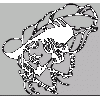Code of Conduct and Ethics: The following is a list of standards to which coaches, players, administrators, and spectators are required to adhere:
A. Proper Conduct and Good Sportsmanship: At the heart of this matter lie several terms that are often hard to define. There is no more important a task that confronts teachers and coaches than to set standards that are fair and honorable. Throughout this Code, when terms such as “proper conduct” and “good sportsmanship” are mentioned, they refer to such standards as these:
- Treat all others fairly.
- Regard the rules of the game as agreements, the spirit or letter of which should not be evaded or broken.
- Do not take advantage of others except by way of superior skill in a sport.
- Treat officials and opponents with respect and with good intentions
- Accept absolutely and without quarrel the decisions of any official.
- Honor visiting teams and spectators as guests and treat them as such. Likewise, act as an honorable guest when visiting another school.
- Be gracious in victory and defeat.
- Be as cooperative as you are competitive.
- Remember that the actions of the coach (on and off the field/court) define him or her.
B. Guidelines for Coaches:
- Coaches must remember that school athletics are primarily a part of each student’s education, not a goal in themselves.
- Coaches shall use athletics to help each student achieve the standards listed in this handbook.
- Coaches must assist each student toward developing his or her fullest capacity in athletics.
- Coaches must give each student equal and fair attention.
- Coaches must remember that the behavior of a team can reflect the coach’s own manner, attitudes, temper, and approach to athletics, and, therefore, coaches must conduct themselves in a way which brings credit to themselves, the team, the sport, and the school.
- Coaches must be responsible not only for coaching the team, but also for running games, dealing fairly and properly with officials, meeting before and after games with visiting coaches and players, and maintaining an objectivity and sense of balance along with good sportsmanship.
- Coaches must preserve the tradition of teams shaking hands after games.
C. Guidelines for Players:
- Players must at all times represent themselves and the school with honor, proper conduct, and good sportsmanship.
- Players must understand that healthy rivalries, based on respect for opponents, are good, but that disrespect for opponents is both unhealthy and unsportsmanlike.
- Players must confine the competitiveness of the game to the field or court, and in particular behave properly on the sidelines and in the locker room both before and after games.
- Players must comply fully with the rulings of the officials. In no way, by voice, action, or gesture, should players demonstrate their dissatisfactions with the decisions made.
- Players must not deface property or remove equipment of any kind from our own or another’s school.
D. Guidelines for Spectators:
- Spectators – whether students, faculty, parents, alumnae/i, or friends – bear important responsibilities to the school for the atmosphere and conduct of games, whether home or away.
- Spectators must watch games from those areas defined by each school as spectator areas.
- Spectators must not run up and down sidelines, call to players, coaches, or officials in an unsportsmanlike manner, go onto the field of play, or deface property. Any action that detracts from the ability of a coach, a player, or an official to do his or her best is not acceptable.
- Faculty members must share responsibility for student discipline at games.
E. Guidelines for Officials:
- Officials must arrive at school well in advance of game time, make themselves available to coaches and other officials, and be prepared to start the game on time.
- Officials must, in dress, conduct, and knowledge of the game rules, advance the objectives of the Code of Ethics.
- Officials must bring understanding and patience to situations that involve young players who err through lack of skill, experience, or maturity.
- Officials must deliver in energy and speed work commensurate with their fullest capacities.
- Officials should always do their best, regardless of the level of competition.










